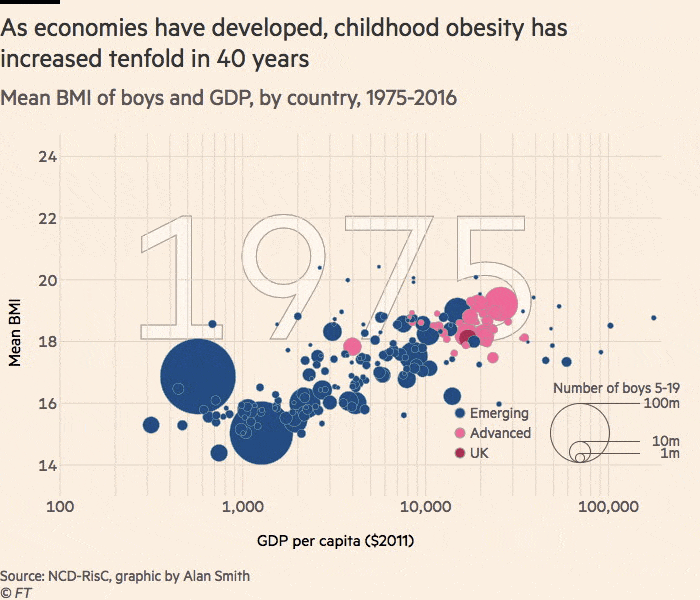FT Health: World Bank says ‘go big, go fast’ to stub out tobacco

Roula Khalaf, Editor of the FT, selects her favourite stories in this weekly newsletter.
Sign up here to receive FT Health by email every Friday.
Buried in the background reading for finance ministers at the World Bank’s annual meetings in Washington this week was an intriguing nugget for politicians interested in the health of citizens and public finances alike.
“There is a policy measure that can simultaneously save millions of lives, reduce poverty, and increase countries’ domestic resources for financing development,” says the World Bank’s Tobacco tax reform at the crossroads of health and development report.
For most experts in public health, there is little doubt that higher excise taxes on tobacco would be a win-win, raising costs as a disincentive to smokers while generating additional income from those who continue to smoke.
Yet governments and international institutions have been ambivalent. They have often listened to advice — or succumbed to pressure — from corporations including the tobacco industry which has steered them away from more aggressive measures. As William Savedoff from the Centre for Global Development, a think-tank in Washington, argues, the International Monetary Fund has stalled and played down how best to use taxes to improve public health.
Now the World Bank goes further, suggesting policymakers “go big, go fast”, tax cigarettes based on quantity not price, and use “soft earmarks” that channel revenues to public health.
Ultimately governments decide on taxation. But international institutions presenting the evidence more vocally — offering technical advice and cajoling national policymakers as part of regular budget scrutiny — can only be positive.
Three questions
We spoke to Poppy Jaman, CEO of Mental Health First Aid (MHFA) and the City Mental Health Alliance to mark World Mental Health Day.
What is MHFA and how does it operate in the workplace?
MHFA is a training programme where we teach people to recognise the early warning signs of mental health issues and do something about it. We're not just about awareness and knowledge but about the confidence to act and direct someone to the right support or self-care. The first thing to do is to sensitise your company. PwC and Deloitte for example have used the "Green Ribbon" campaign to indicate they are open to talking about mental health. The second thing is to get buy-in at different levels: mental health needs leadership support.
Can you measure its effectiveness?
We have a number of different evaluations and companies do their own internal ones. Unilever was able to demonstrate an increase in utilisation of their employee assistance programme and a decrease in sickness absence. They also did a return on investment calculation which was very positive. The University of Nottingham is carrying out an independent study on the effect of MHFA in the workplace and we've had a valuation done by The University of Gloucestershire into our armed forces programme. This has now been taken up by the RAF and has become a mandatory part of their welfare staff development.
Can anybody become a Mental Health First Aider?
Yes. Our target audience in the first place is line managers or people responsible for people, but not exclusively. One in four people are going to experience mental health issues so really we should be looking at getting one in four people in any organisation educated on this. Mental health doesn't discriminate and neither should we.
Podcast: Emma Jacobs talks to Jaan Madan of Mental Health First Aid England and Nigel Jones, chair of the City Mental Health Alliance.
Chartwatch

Obesity fears The number of obese children and teenagers has increased 10-fold over the past four decades according to the most extensive analysis ever of body weight. A separate study said the global cost of obesity-related illness would hit $1.2tn from 2025. Junk food brands in the UK spend 27 times more on advertising than the government does on healthy eating promotions. (FT, Lancet, Guardian, Telegraph)
News round-up
Tackling NCDs The WHO's new high-level commission on noncommunicable diseases aims to address the illnesses that kill 40m people each year — 70 per cent of all deaths. Advocates fear global targets are slipping: "Big donors are just not interested in funding for NCDs." (WHO, Devex)
World hunger The Global Hunger Index, which tracks food insecurity and hunger trends, says UN goals of reaching zero hunger by 2030 are under threat, thanks to conflict. The index measures under-five mortality; wasting and stunting in children and the proportion of undernourished people. (GHI, Devex)
Cancer developments Pfizer of the US and India's Cipla have agreed to supply cut-price cancer drugs to Africa. The disease kills about 450,000 Africans a year and could reach a million by 2020. Here's our guide to the most exciting cancer developments: diagnostics; liquid biopsies; targeted drugs; and data mining. (NYT, FT)
China cheer Beijing will allow data from overseas clinical trials for approvals of new drugs. The move will help multinationals — currently suffering from Chinese government pressure on prices — bring products into the world's second largest pharma market much more quickly. (FT)
Gene therapy boost The likely US decision to pass Spark Therapeutics' DNA eye treatment could herald a new era of medicine. Gene therapy is a method of controlling disease by inserting functioning copies of genes that are missing or mutated. (FT)
Obamacare blows President Trump ended a key healthcare subsidy for the poor in a move that will probably destabilise health insurance exchanges. He also signed an order to make it easier to buy basic insurance plans exempt from Obamacare requirements. (NPR, Reuters)
Birth control battles in US New rules from President Trump will limit birth control options, widening the range of employers and insurers that can invoke religious or moral beliefs to avoid Obamacare requirements on contraceptives. Opponents say the move will lead to more abortions. (Washington Post, NBC).
. . . and in Africa Healthcare workers in Nigeria are fighting resistance from religious groups as they encourage take-up of contraception while in Tanzania, no pregnant girl will be allowed to study in a state school, nor readmitted after giving birth. (FT report on adolescent girls)

US drug price move California will make pharma companies publicly justify big increases in drug prices, fighting off industry opposition that says it focuses too much on one part of the distribution chain and not on the discounts received by insurance companies and pharmacy benefit managers. (Kaiser)
Pfizer eyes consumer sale The US drugmaker has followed Merck in considering a sale of its consumer healthcare business. Do such businesses provide stability in an unpredictable industry or use up resources that should be spent on discovering new medicines? The FT's Lex analysts say buyers will pay well to get hold of brands such as Advil and Chapstick. (FT)
NHS under pressure The UK health regulator's annual report warned the NHS was "straining at the seams" as services faced extreme challenges from an ageing population with complex care needs. England's chief medical officer warned of an "antibiotic apocalypse" ahead of a new awareness campaign to curb their over-prescription. (CQC, BMJ, Telegraph)
Dementia sport link The Jeff Astle Foundation, which campaigns on brain injuries in sport, called for an inquiry after it was alleged that English football authorities had been informed of a possible link between heading the ball and dementia in 1995 but refused to act. A new study from FIFPro, the world players' union, says there is evidence linking concussion on the field with mental health problems. (Telegraph, BBC)
Best from the Journals
Palliative care More than 25.5m people a year — half of all deaths and including 2.5m children — die in suffering for want of inexpensive pain relief and palliative care. Eighty per cent are in poorer countries which get less than one per cent of the world's morphine — a key element of palliative care. (The Lancet)
Blindness and impaired vision The number of people with blindness and vision impairment is increasing as populations grow and age. The two main causes — cataract and uncorrected refractive error — together contribute to 55 per cent of blindness and 77 per cent of impaired vision in the over 50s. The IAPB Vision Atlas maps prevalence by country. (Lancet, IAPB)
Malaria in Africa An analysis of more than 100 years of malaria data show large declines in the plasmodium falciparum parasite since 2000 but not uniformly across the continent. New tools are needed for poorer countries and high malaria-burden areas where gains have stalled. (Nature)
AMR in Africa Antimicrobial resistance is an increasing threat to children admitted to hospital in sub-Saharan Africa. Without AMR awareness programmes and improved infection control, a century of gains in child survival rates could be undermined. (The Lancet)
Financing the fight against epidemics The big global efforts against Aids, TB and malaria are under-financed, creating a real threat of resurging diseases — at the same time as resistance to drug treatment is growing. (The Lancet)
Preventing liver cancer A global study of the fourth leading cause of cancer death after lung, colorectal, and stomach cancer says the disease is highly preventable through vaccination, antiviral treatment, safe blood transfusion and injection practices, as well as reduced use of alcohol. (Jama)
Heartache Marital strife is not just metaphorically bad for your heart but may also have links to cardiovascular disease. "Marriage counselling . . . may have added benefits in terms of physical health over and above psychological wellbeing — though in some cases ending the relationship may be the best outcome." (BMJ)
Podcast of the week
Doctors' lives A new series showcasing the experiences of doctors on the frontline. An MSF worker travels to west Africa during the middle of the Ebola outbreak and is faced with cultural misunderstandings. (BMA Doctors' notes, 20m)
Coming up
Join us for a Facebook live discussion on Tuesday October 17 with Natalia Kanem, new head of UNFPA, on the State of the World's Population report.
In case you missed it
Previous edition: The silent epidemic of sleep loss
Back editions and more at facebook.com/ftonhealth
Latest news at www.ft.com/health and Twitter @FT_Health
Final thought
Loneliness kills The leader of Britain's family doctors has warned that lonely patients are 50 per cent more likely to die prematurely than those with good social networks as loneliness can be as bad for someone’s health as long-term problems such as diabetes or high blood pressure. (The Guardian)
Comments